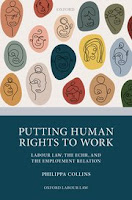Tuesday, 25 January 2022
Public Lecture on Positive Obligations under the ECHR - Within and Beyond Boundaries
Friday, 14 January 2022
New Book: Putting Human Rights to Work
Monday, 10 January 2022
EIN Colloquium on Implementation of Judgments in French
Wednesday, 5 January 2022
The New Year and What is Coming up at the Court
1. As the Court announced in one of its last press releases of last year, the much contested dissolution of Russia's oldest human rights NGO Memorial will be reviewed under the ECHR. In the meantime, and as far as we are aware, applying interim measures for the first time in a freedom of association case, the Court requested Russia to suspend enforcing the domestic court decision to close the NGO and its affiliates. This is the message on the ECtHR's own website:
'On 28 and 29 December 2021 respectively, the International Memorial and the Memorial Human Rights Centre reiterated their request to the European Court of Human Rights under Rule 39 of the Rules of Court to apply an interim measure to prevent their forced dissolution following the adoption of the judgments of 28 and 29 December 2021 by the Supreme Court of Russia and by the Moscow City Court, respectively.
The Court has decided to indicate to the Government of Russia, under Rule 39, that in the interests of the parties and the proper conduct of the proceedings before it, the enforcement of the decisions to dissolve the applicant organisations should be suspended for a period that would be necessary for the Court to consider the application.'
2. Looking ahead, this month will witness one of the Court's most awaited hearings of recent times, the one in the inter-state case Ukraine and The Netherlands v the Russian Federation. Inter-state cases are rare and always very sensitive. The hearing was already deferred from last year and the cases focuses on the downing of infamous Malaysia Airlines flight MH-17 in 2014 above Ukraine during the armed conflict there. Meanwhile, the criminal case against four main suspects in absentia is progressing in Dutch domestic courts, in parallel. The hearing in Strasbourg is now scheduled for 26 January.
3. And finally, a crucial change for potential applicants will enter into force on 1 February. From then on, the time-limit for submitting a complaint in Strasbourg will be reduced from 6 to 4 months after exhausting domestic remedies. This is the most visible change resulting from the entry into force of Protocol 15 ECHR last year, of which the transition period ends in a few weeks. New applications submitted after 1 February can only be declared admissible if they comply with this new time limit.




